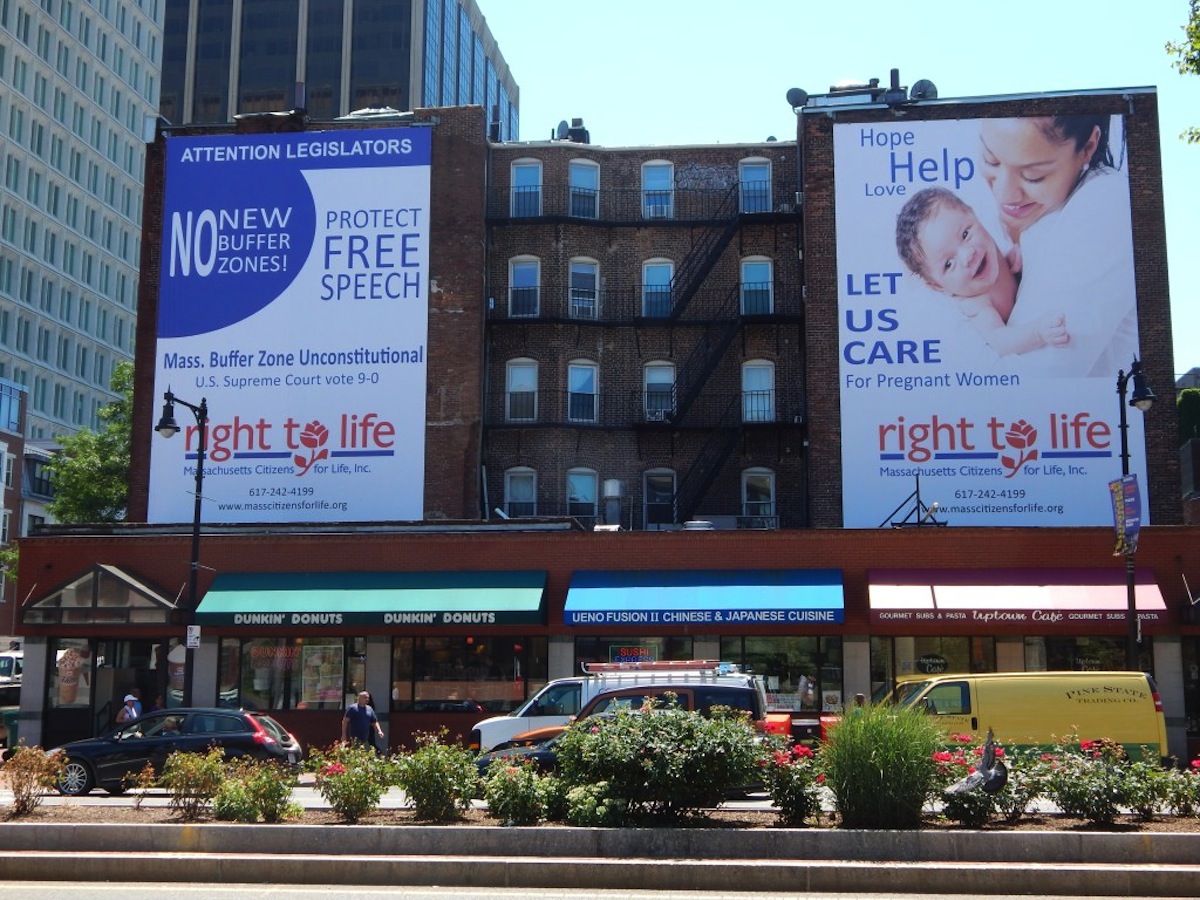Despite Court Ruling, the Back-and-Forth Over ‘Buffer Zones’ Continues

Image Courtesy of Massachusetts Citizens For Life
In the weeks since the Supreme Court struck down the “buffer zone” law that separated pro-life protesters from patients trying to gain access to abortion clinics, the battle over what happens next in Massachusetts hasn’t let up one bit.
Not long before state legislators and elected officials like Attorney General Martha Coakley and Governor Deval Patrick announced that language was filed on Beacon Hill to put new protections in place to fill the gap for the defunct buffer zone laws, an anti-abortion advocacy group unveiled two large banners on the side of a building on Cambridge Street, steps from City Hall, calling for supporters to stand with them in blocking any further changes to circumvent the court’s ruling.
“New legislation…in all likelihood will lead to more litigation due to infringement on the right of citizens to use the public sidewalk for the two primary methods of communicating their message to persons entering abortion clinics,” members from Massachusetts Citizens for Life wrote in a letter to state leaders, prior to unfurling the banners on the building front this week.
They said they are “very excited” about the billboards, which demand no new buffer laws, and call an attempt to enact any updated version of the old law an infringement on free speech. “These billboards will be seen by legislators traveling to the State House and by the 60,000-plus people who pass along these roads on a daily basis.”
In June, the Supreme Court ruled that having a 35-foot invisible barrier between protesters and patients was unconstitutional because sidewalks are typically places where First Amendment rights should be protected. The ruling wiped out a state law passed in 2007 that meant to diffuse the intense interactions between pro-life advocates and patients or employees going in and out of the clinics.
Not long after the court’s ruling, state leaders announced they would work on coming up with an alternative solution to the buffer zones, and on Monday unveiled legislation filed in response to the court’s decision. Elected officials hope to push the bill through the halls of the State House before the voting session ends on July 31.
Called “An Act to Promote Public Safety and Protect Access to Reproductive Health Care Facilities,” which was filed by Senator Harriette L. Chandler, with the support of Coakley, Patrick, and advocates from Planned Parenthood, the bill would allow law enforcement officials to order immediate dispersal of groups of protesters if they block access to a facility, and move them back 25 feet if necessary. It would also allow for officials to issue fines if a person doesn’t abide by the rules.
“The Supreme Court’s recent decision has left Massachusetts in an emergency situation regarding staff and patients of reproductive health care centers,” said Senator Chandler in a statement. “The Commonwealth has had actual experience with violence against staff and patients. Therefore, it is crucial to provide protections for the void left by the Supreme Court’s decision before further harassment, intimidation, and violence occurs.”
According to the State House News Service, the Joint Committee on the Judiciary will meet Wednesday morning to listen to testimony from the general public about the Supreme Court’s recent decision, and later hold a hearing on Chandler’s bill.
Along with their billboards, however, Massachusetts Citizens for Life members are asking the bill’s supporters to back down. “Massachusetts Citizens for Life urges the legislature to let law enforcement apply existing laws before writing any new ones,” said Anne Fox, president of the group. “Let’s not waste the time of the legislators and the tax money of the citizens to end up before the Supreme Court again.”

